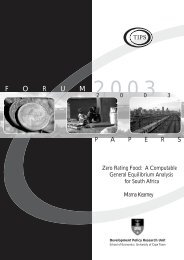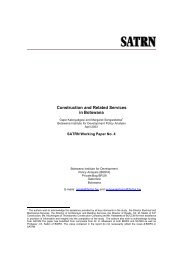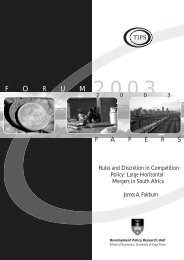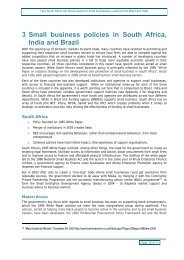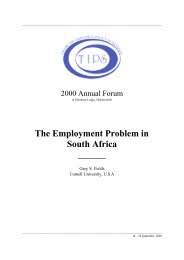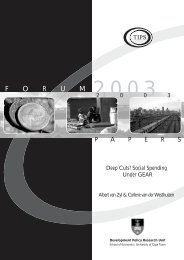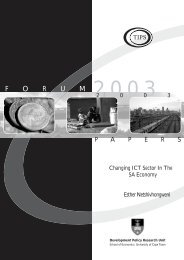Monitor Vol 39 08_Final_Nov08.pdf - tips
Monitor Vol 39 08_Final_Nov08.pdf - tips
Monitor Vol 39 08_Final_Nov08.pdf - tips
Create successful ePaper yourself
Turn your PDF publications into a flip-book with our unique Google optimized e-Paper software.
Second, the constraints imposed by the WTO will require that South Africa’s<br />
two current sector specific policies – namely those for autos and auto<br />
components and for textiles and clothing – will have to be fundamentally<br />
re-designed. The MIDP has been widely held as a highly successful policy,<br />
although this perspective has been strongly challenged. 24 Whatever perspective<br />
is adopted in regard to the MIDP, it is clear is that the MIDP is no<br />
“model” to be followed in other sectors. Export-import complementation<br />
schemes, such as are currently operative in the autos and auto components<br />
and the clothing and textiles sectors, are likely to be successfully<br />
challenged in the WTO. What has worked in the past (arguably) provides<br />
little guide for the future. Moreover, since it will be difficult to confine any<br />
support pogrammes solely to exports, any new programmes are likely to<br />
require considerable resources. Assessments of the economy wide implications<br />
will need careful consideration – something that has been largely<br />
absent from the design of existent support programmes.<br />
As regards institutional and governance requirements, custodianship and<br />
system wide responsibility for industrial policy should be clearly demarcated<br />
within government. The overriding objective of industrial policy is<br />
to raise the productivity and efficiency of firms. This is consonant with<br />
the objectives of the dti. Public enterprises and Treasury have other objectives.<br />
Responsibility for industrial policy should therefore rest with the<br />
dti. While there may be real or perceived weaknesses in the dti currently,<br />
attention should be given to enhancing the dti’s capacities to manage<br />
and direct industrial policy. The proliferation of interventionist industrial<br />
policies, albeit under other guises, needs to be carefully reconsidered. The<br />
desirability of such policies cannot be assessed solely on their own terms.<br />
They should also be assessed in terms of how they contribute systemically<br />
to the structural transformations being sought for the South African<br />
economy as a whole.<br />
To reiterate, industrial policies are growth policies. They are correctly centrally<br />
directed at raising firm level productivity and efficiency. There is a<br />
danger that requiring industrial support measures, in addition, to make<br />
a substantial contribution to other equity objectives – notably employment<br />
creation and the development of black and female owned firms<br />
– may serve to blunt the central purpose and efficacy of industrial policy.<br />
It Industrial policy supports do necessarily tend to favour certain firms<br />
and hence raise returns for recipients. One consequence is that they can<br />
therefore entrench existent firms which may impose barriers to entry for<br />
new firms. In designing industrial support measures, it is therefore important<br />
to attempt to ensure that these measures do not unduly serve to<br />
raise the barriers to entry for new firms. Similarly, government will want<br />
to safeguard against support measures enhancing capital intensity and<br />
resulting in employment loss. Industrial policies should therefore be seen<br />
as essentially growth policies. Industrial policies must accord with and<br />
can make some, albeit modest, contribution to government’s equity objectives.<br />
In the main, however equity goals are best addressed through other<br />
measures that are specifically targeted to these goals. 25<br />
The efficacy of industrial policy is heavily dependent on policies implemented<br />
elsewhere in government. Of particular importance is the issue<br />
of skills. Skills have been identified as currently the key constraint on firm<br />
investment and performance. The evidence suggests that the supply of<br />
skills is not being augmented and that despite their difficulties in securing<br />
skills, firms are nevertheless undertaking very little training.<br />
Perhaps the most important institutional and governance requirement for<br />
an effective industrial policy relates to the respective roles of government<br />
and the business sector. Governmental capacities to formulate and to<br />
implement industrial policy are currently very limited. Where governmental<br />
capacities are very limited, the private sector rather than government<br />
should play the leading role in the identification of constraints and opportunities<br />
for sectors and in the design of policies to address these.<br />
This perspective has informed the approach taken in the development of<br />
the provincial microeconomic development strategy (MEDS) in the Western<br />
Cape. What is envisaged in the MEDS is that given its near monopoly<br />
on information, the proposals for enhancing productivity and efficiency<br />
will emanate very largely from business. While the proposals emanate<br />
from business, the decision on which proposals to support remains with<br />
government. Government should make its decisions on which proposals<br />
to support based upon its declared objectives for output particularly and<br />
also for equity. Since government’s capacities are limited, decision making<br />
may well require government having recourse to external advice (Western<br />
Cape Government, Department of Economic Development and Tourism,<br />
2005: 135).<br />
Institutionally, strategic collaboration can take a number of forms. Sector<br />
associations are one institutional mechanism for the engagement of business.<br />
In the Western Cape, a different institutional mechanism is operative.<br />
In this province, the provincial government has established a number<br />
of special purpose vehicles (SPVs) which are primarily composed of business<br />
representatives with some representation of sector specialists from<br />
41<br />
Trade & Industry <strong>Monitor</strong><br />
24 Flatters, 2005.<br />
25 Of course, it will also be important to ensure that policies for employment creation or BEE<br />
will need toaccord with industrial policies.<br />
Industrial Policy in South Africa: Targets, Constraints and Challenges



